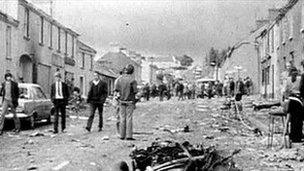Amnesty report: Troubles victims 'failed' by system
- Published

The report said more could be done to help victims of events like the 1972 Claudy bombings
Troubles victims have been "failed by a flawed and fragmented approach" to dealing with Northern Ireland's past, Amnesty International has said.
The organisation said victims and their families had been let down by the Historical Enquiries Team (HET), the Police Ombudsman and various coroners' inquests, due to their narrow remit.
The report calls for a replacement for the troubled HET.
It comes ahead of key talks on issues such as parading and the past,
The report blamed what it describes as an "inadequate patchwork of investigations and lack of political will for cementing sectarian divisions".
Amnesty's director for Europe and Central Asia, John Dalhuisen, said: "There's a cruel irony in the fact that Northern Ireland is held up as a success story when many victims' families actually consider their treatment a failure."
The HET has been heavily criticised after a damning report by Her Majesty's Inspectorate of Constabulary found that deaths involving soldiers were carried out with less rigour than those linked to paramilitaries.
Amnesty has called for the UK government to establish a new method of dealing with the past that would permit controversial killings and attacks carried out by all sides, including state agents, to be re-investigated.
The new mechanism should be able to identify those responsible at all levels and issue recommendations aimed at securing victims' right to reparation, the report said.
Amnesty also wants retired police officers to be compelled to co-operate with the Ombudsman's office and for enough resources to be allocated to prevent delays in the investigation and processing of historical cases.
Scars
The 78-page document detailed experiences of victims from Protestant and Catholic communities throughout Northern Ireland.
Other recommendations include the establishment of public inquiries into the murder of solicitor Pat Finucane in 1988 and the Omagh bomb in 1998.
Mr Dalhuisen said over the last decade a patchwork of measures, including isolated investigations, have failed to establish the full truth about the violations and abuses of the past.
"The UK government and all political parties in Northern Ireland need to grasp the nettle now and agree a new approach which is capable of dealing fully with the past."
More than 3,600 people were killed during three decades of sectarian conflict in Northern Ireland. A further 40,000 were injured.
James Miller, whose grandfather David Miller was among nine people killed in an IRA bomb attack in Claudy, County Londonderry, in 1972, said relatives were determined to find answers.
"It's said they are waiting for us to die out. But the next generation will still keep asking questions about what happened," he said.
Peter Heathwood was shot and left paralysed in an attack on his home by suspected loyalist gunmen in September 1979.
"People say let's forget about the past and move on, it was 30 years ago. That's a load of bunkum," he said.
Mr Heathwood, whose father died at the scene after suffering a heart attack, said that in Northern Ireland the past is the present.
"If we don't deal with the past, I don't want my grandchildren to have to suffer this again.
"As injured people, we are living scars in society and we need to have it recognised that we have suffered."
Amnesty International has also called for the Irish government to support the establishment of a single new mechanism for dealing with the past.
Ulster Unionist Justice spokesperson Tom Elliott described the Amnesty report as a self-promotional publication.
"The report just adds their weight to attempts to discredit the security services and the work they did throughout the very difficult times of the Troubles, while at the same time calling for a public inquiry into the killing of Pat Finucane but no such demand for the countless murders carried out by the IRA.
"That just speaks volumes of the one-sided approach that this organisation has taken," he said.
"The authors even go so far as to claim there should be a single mechanism for dealing with the past, while at the same time calling for public inquiries into the Finucane killing and the Omagh atrocity, which is obviously putting these outside the single process."
Sinn Féin said the party would study the Amnesty proposals.
"However it remains the position of Sinn Féin that what we need to see as a mechanism to deal with the past is the establishment of an independent, international truth recovery body," said Mitchel McLaughlin MLA.
"The foundation of such a process cannot have the British government as so called arbiters - they were a party to the conflict and as such continue be involved in cover-ups while refusing to deal adequately with issues such as collusion and shoot to kill."